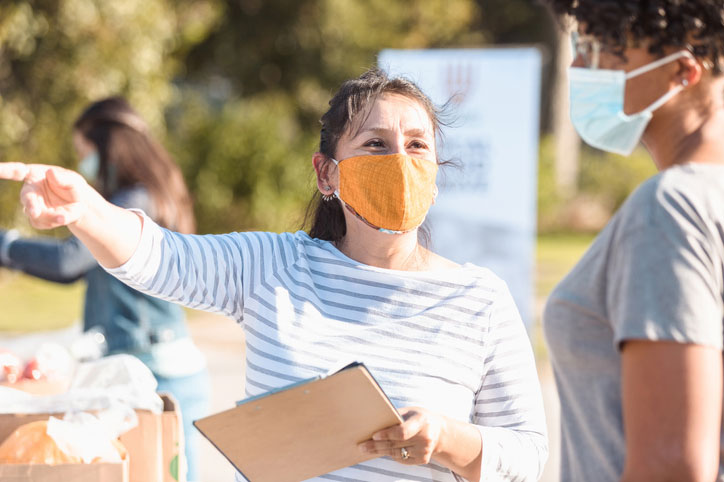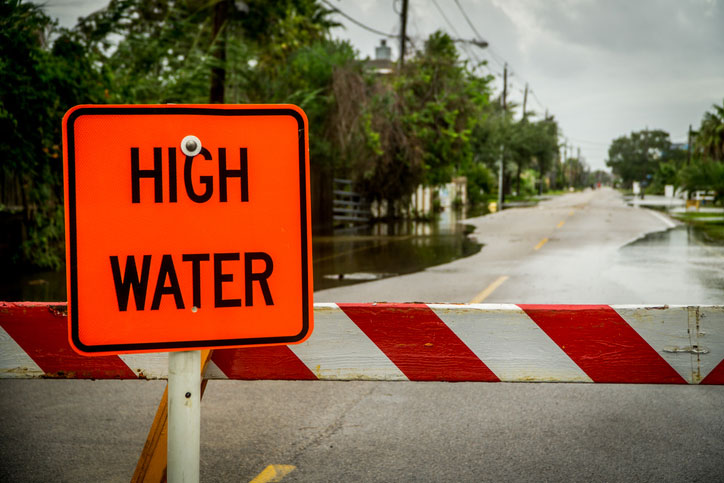Written by Jack Levinson

The past several decades have been characterized by an unprecedented number of natural disasters whose impacts have been immensely destructive to cities all over the world. These weather events, brought about by ongoing patterns of climate change, show no signs of slowing, despite the best efforts of environmentalist groups to cap carbon emissions and reverse the damage humans have done to the health of our planet.
Those who have an interest in environmental issues alongside other social causes understand that the two are increasingly linked.
Underserved populations are the most at risk of facing long-term impacts of natural disasters, as they lack the resources to find support and solutions after crises. This is where social workers come in.
Featured Programs:Sponsored School(s)

Disaster relief social workers can essentially serve as first responders for the welfare needs of those hardest hit by weather catastrophes, helping people in need find the essential short- and long-term resources to help rebuild their lives. This can be nothing short of life-saving for people whose experiences are upended by natural disasters, many of whom need a variety of supportive services at once in the aftermath of a crisis.
If you’re motivated to help individuals and communities who are facing some of the most difficult experiences of their lives, you will make a profound impact as a crisis relief social worker. Equipped with extensive training, a compassionate ear, and a calm disposition, you’ll be able to act as a calming influence and a practical expert when people are at their lowest. Though it is by no means easy work, the role of a disaster relief social worker offers the deep spiritual reward of helping people overcome the unimaginable.
What is Crisis Intervention in Social Work?
Many branches of social work can involve crisis intervention. From cases of domestic violence, child abuse and neglect, and other instances of violence to helping those experiencing critical needs such as starvation or healthcare emergencies due to poverty, there are many reasons why social workers can be called upon to step into precarious situations. In these roles, social workers must act quickly but judiciously, pulling off a difficult balancing act in order to keep the situation contained and provide effective, empathetic solutions.
Examples of crisis situations in social work include the following:
- Incidents of domestic violence as well as threats of harm
- Child abuse and neglect
- Mental health emergencies
- Substance abuse crises
- Community violence incidents
- School crises
Most crisis intervention social workers will be dedicated to just one of these issues, with the training and expertise needed to address them thoroughly for impacted parties.
The primary goal of crisis intervention is to stabilize the situation, alleviate the impact of the crisis, and provide direct support to impacted individuals, families, and communities to make rehabilitation and relief possible.
Regardless of what type of social work organization you work for, if your responsibilities extend to crisis management, your efforts will be in service to this core goal.
Disaster Relief Social Work
Those who specialize in disaster relief intervention provide this type of crisis intervention specifically to individuals, families, and communities experiencing fallout from devastating events like floods, fires, tornados, blizzards, and other weather catastrophes. These events impact people of all backgrounds, of course, but it is those who are under-resourced who face the deepest and most lasting consequences of them. These can include:
- Homelessness
- Loss of income
- Economic hardship due to the cost of home and property damage
- Healthcare issues
- Psychological issues including PTSD and other forms of emotional strife
As you can see, this is a wide and complex range of issues, some of which require immediate solutions and others of which call for a longer-term approach to support. After all, for those whose lives are sent into upheaval after disasters, the consequences can last for months if not years. This means that disaster relief social workers are invested in providing for impacted individuals and families long after the immediate aftermath of a weather event.
The Role of a Social Worker in Crisis Management
Social workers in all forms of crisis intervention have a core of responsibilities they take on for their clients. Not every social work role will require you to perform all these duties, and many by design will focus on only one or two. But these general duties speak to the crisis intervention model in social work.
- Assessment. First-responder social workers are first tasked with evaluating individuals’ and families’ needs in the immediate aftermath of a crisis. These can range from material needs to healthcare needs to psychological needs. These assessments are critical, providing the foundation for all interventions to come.
- Intervention and resolution planning. After making their assessments, crisis intervention and disaster relief social workers must develop intervention plans for their clients. These will be mindful of the long-term impacts of a given crisis and any intersecting issues a client might face.
- Referral and resource facilitation. After designing intervention plans tailored to the specific needs of their clients, crisis intervention social workers will act as intermediaries between impacted individuals and a variety of resource-providing organizations that can address the various needs each person might face.
- Emotional support and engagement. Those who work in crisis intervention must cultivate supportive and empathetic relationships with their clients, building trust to form deep and transparent relationships that will yield the most comprehensive care possible. Those who are Licensed Clinical Social Workers (LCSWs) may provide therapy or emotional counseling to their clients as well.
- Follow-up. Some crisis intervention social workers are involved in providing follow-up assessments for clients to ensure their interventions are meeting their needs and account for any new necessities that may have arisen over time.
Which of these duties you perform will depend on your position and the type of organization you work for. However, it’s helpful to have an understanding of the full cycle of supportive services crisis relief social workers provide.

How Social Workers Stepped Up in Houston After Hurricane Harvey
Anyone who lived in Texas in 2017 will recall the devastating impact of Hurricane Harvey on the city of Houston. Designated as a category four hurricane by the National Weather Service, this storm brought catastrophic flash floods to the city of Houston, displacing countless Houston residents and creating long-term economic challenges for individuals and families throughout the city.
The role of disaster relief social workers in the immediate aftermath of the storm was tremendous, requiring no shortage of emotional fortitude and courage to step up in spite of the calamitous and even dangerous circumstances of the moment.
From helping facilitate short-term plans for displaced people, as well as assisting those who needed immediate medical or psychological services, to overseeing the renewal of the city of Houston in the long term, social workers have been nothing short of heroic in addressing the damage wrought by Hurricane Harvey. To illustrate the long-lasting impact of these hardships, it’s worth noting that the City of Houston’s Housing and Community Development Department is still investing in recovery initiatives in 2024. These include homeowner and renter assistance programs, economic development programs for small businesses, low-income housing development, and planning initiatives to help protect the city from environmental disasters in the future.
Though Hurricane Harvey was a tragic and traumatic moment in Houston’s history, social workers should be proud of the role they have played in helping vulnerable individuals and families back on their feet. If you are moved to join these efforts, a career as a disaster relief social worker will allow you to contribute to these changes yourself, impacting Texas and the country at large for the better.
Disaster Relief Social Work Jobs
There are a number of job titles for crisis intervention social workers, each with its own set of responsibilities and focus areas. They can be employed in any number of social work organizations, from government agencies to nonprofits to healthcare providers and more.
Some of the top crisis intervention social work job titles include:
- Crisis Intervention Specialist
- Emergency Response Social Worker
- Suicide Prevention Counselor
- Trauma Response Social Worker
- Domestic Violence Advocate
- Community Crisis Responder
- Mobile Crisis Team Member
- Child Welfare Crisis Worker
- Emergency Mental Health Clinician
- Hospital Crisis Social Worker
- School Crisis Interventionist
- Substance Abuse Crisis Counselor
- Trauma-Informed Care Coordinator
- Grief and Loss Counselor
- Disaster Response Social Worker
- Mental Health Crisis Case Manager
- Intake and Assessment Specialist (Crisis Services)
- Child and Family Crisis Therapist
- Emergency Shelter Social Worker
- Sexual Assault Crisis Advocate
- Emergency Housing Navigator
- Crisis Stabilization Clinician
- First Responder Support Social Worker
- Rape Crisis Center Counselor
- Telehealth Crisis Counselor
You will be equipped with the foundational training you need from your Master of Social Work program, which is required in order to obtain your social work license in Texas. However, each individual role is likely to involve its own issue-specific training, teaching you the foremost crisis intervention techniques in social work related to that issue.
It’s worth noting that roles involving counseling and therapeutic services will require you to be a Licensed Clinical Social Worker (LCSW). These are the only social work professionals authorized to provide therapy to their clients. All other roles can be held by those who hold Licensed Master of Social Work (LMSW) certification. For more information on obtaining a social work license in Texas, visit our guide here.

Crisis Intervention Social Worker Salary
Because crisis intervention social workers are employed in so many different social work organizations, it can be difficult to deduce exact averages to determine anticipated salaries for this general profession. The Bureau of Labor Statistics, the authoritative source on salary data for the United States, unfortunately does not provide isolated data on crisis relief social work.
However, since crisis relief social workers are employed within practically every branch of the field, it can be helpful to see the BLS’ data for a general sense of what social workers earn in Texas. For the four primary social work categories, the BLS reports the following mean annual salary for Texas-based social workers:
- Child, family, and school social workers: $49,810
- Healthcare social workers: $62,500
- Mental health and substance abuse social workers: $44,100
- Social workers, all other: $68,500
These can give you a broad sense of what you will earn as a crisis management or disaster relief social worker.
All figures are taken from the Bureau of Labor Statistics’ May 2022 report, accessed in February 2024.
Taking the Next Steps to Become a Crisis Intervention Social Worker
Are you ready to make a difference in the lives of those in critical need? Your first step will be obtaining your Master of Social Work degree, followed by your Texas social work license at whatever level you wish to pursue.
For more information on how to become a social worker in Texas, visit our guide here.
Texas is abounding with educational opportunities for aspiring social workers.
FAQs
What are some examples of crisis situations in social work?
There is a wide variety of circumstances that can fall under the category of “crisis social work,” including interpersonal issues like domestic violence, sexual assault, and child abuse and neglect; personal issues such as mental health and substance abuse emergencies; and broad-scale catastrophes such as natural disasters, community violence, and more.
Do I need an MSW to become a crisis intervention social worker?
Yes. In the state of Texas, you must hold a social work license in order to practice crisis intervention social work. This requires you to obtain your Master of Social Work degree.
Where do crisis intervention social workers receive their training?
Crisis intervention social workers will learn the fundamentals of their profession while in their MSW programs, receiving additional training during their field work opportunities. You’re also likely to receive an extensive orientation in your job to illuminate the best practices and procedures you’ll be expected to employ in your work.
Do I need to be an LCSW to perform crisis intervention?
Not necessarily. If you are involved in resource allocation and similar work, you will only need to hold LMSW certification. However, if you intend to provide therapy to individuals and families impacted by crises, you will need to become an LCSW.






